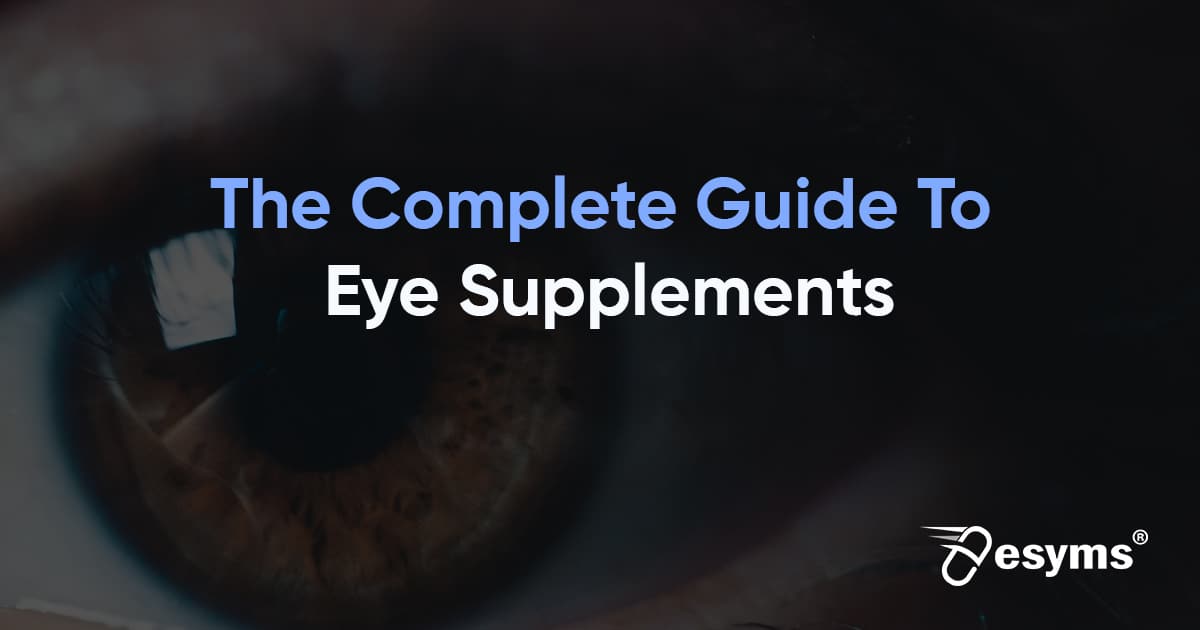The Complete Guide To Eye Supplements In Malaysia
- Esyms Team
- October 14, 2021
- 6:09 pm
SHARE THIS ARTICLE
BROWSE OUR REVIEW

Eye Supplement Ingredients
1) Lutein and Zeaxanthin
Lutein and Zeaxanthin are carotenoids found in leafy vegetables and plants. In plants, these 2 are responsible in absorbing excess light and preventing plants from being damaged by too much sunlight. Coincidentally, lutein and zeaxanthin are also found abundantly in our eye, specifically in the macula. They absorb harmful blue light and prevent it from reaching the retina, which in turn decreases light-induced oxidation of the cells. This helps in preventing macular degeneration (AMD), which is described further along in this article.
2) Bilberry
Bilberries are blue berries native to northern Europe. While traditionally used to dye paper and linen, it is now included in many supplements primarily aimed in improving eye health. It contains high amount of anthocyanins (pigments that are powerful antioxidants) which helps in maintaining the health of our retina and prevent conditions like AMD and cataracts.
3) Vitamin A & Beta Carotene
Vitamin A is a group of antioxidants which is useful in protecting the eye and mucous membrane and prevents infection. Depending on the source, there are 2 types of vitamin A:
- Retinol: Can be directly used by the body and can be sourced from products like beef, chicken and cheese
- Provitamin-A carotenoids: Converted to retinol upon ingestion. Source includes colorful fruits and vegetables such as carrots and sweet potatoes. Beta-carotene is considered an effective provitamin-A carotenoid and a powerful antioxidant.
Vitamin A, along with other antioxidants, helps in preventing conditions such as dry eyes and helps in macular degeneration.
4) Glutathione
This might be a familiar name to some of you who are into skin brightening and the works. As you can see by now, most of the supplements named so far are related to antioxidation in one way or another. Glutathione is a substance produced by the liver and can also be found in fruits and vegetables. It is an antioxidant which helps prevent conditions such as glaucoma and cataracts.
5) Alpha Lipoic Acid
Alpha Lipoc Acid (ALA) is produced in the body by our mitochondria, the powerhouse of our cells. ALA is also an antioxidant which is produced in small quantities. It can be found in foods such as spinach, organ meats, and broccoli. As we age, our body produces less ALA and this can lead to conditions such as glaucoma. ALA is often given to those who have diabetes to help in nerve damage and this helps in patients with diabetic retinopathy. ALA also helps to increase the level of glutathione in the body.
6) Grape seed extract
Grape seed extract is derived from the ground-up seeds of red wine grapes. It contains Oligomeric proanthocyanins (OPC), an antioxidant which protects cells from oxidative damage. Similar to the aforementioned ingredients, it helps in cataract prevention and macular degeneration.
How does age affect my eyes?
It is important to know what happens to your eyes as you age. Here are some of the eye conditions we commonly experience.
1) Cataract
Cataract is a condition whereby the lens in your eye gets cloudy. It is a fairly common condition which affects a huge percentage of the general population. Looking through a lens with cataract is like looking through a frosted glass or window. It usually affects a small part of your vision, but as it grows larger, it might affect daily activities and surgery is required.
2) Dry eyes
Our eyes need regular moisturisation. As we age, so does our tear glands. This leads to a decreased secretion of tears and causes our eyes to dry up. Common symptoms include stinging or burning sensation of the eyes. This can be treated with artificial tears and eye drops. Dry eyes is particularly prevalent in females who has gone through menopause.
3) Macular degeneration
Age-related macular degeneration, or AMD, is the leading cause of blindness among seniors. AMD affects an area in the eye called the macula. It is located in the retina, which is the layer behind the eye which is responsible for visual sharpness. A patient with AMD loses central vision but maintains peripheral vision. Imagine looking at something with its center blotched out. One of the main causes of AMD is oxidative stress which can be prevented by certain supplements.
4) Diabetic Retinopathy
Okay, this is not exactly caused by old age. However, the longer you have diabetes, the more prevalent this condition is. Diabetes is a medical condition when uncontrolled, can lead to many serious complications. In patients with poorly controlled blood sugar level, the blood vessels in retina can be damaged by high amounts of sugar.
5) Glaucoma
The fluid in our eye, known as the aqueous humor, drains and exits the eye through a mesh-like channel. When this channel gets blocked, the fluid builds up in the eye and this causes the pressure to increase. As the pressure gets too high, this damages the optic nerve – the nerve that is responsible for transmission of information from the eye to your brain. This can cause loss of vision and if severe, blindness.
Should I have my eyes checked?
Often times, people wait too long before visiting a doctor. But what professional should you be consulting?
- Opticians: These are the people you see in spectacle shops. They are assigned with the task of selling glasses and eyeware. They do not diagnose eye conditions.
- Optometrist: They are professionals who can conduct tests and diagnose eye problems. Usually there will be at least one present in eyeware shops. They can prescribe contact lens and prescribe eye medications to treat certain diseases.
- Opthalmologist: They are medical doctors who specialize in eye care and treatment. They undergo more extensive training and are able to perform surgery. They diagnose all eye diseases and prescribe medications.
It is best to have your eyes checked every one or two years if you are above the age of 40 or if you have existing eye conditions or past trauma to the eye.
Eye Supplements For Teenagers
Although most eye conditions develop at a later age, there is no harm in starting early. Taking good care of your eyes early on is certainly worth the effort. If you notice any changes to your vision, be it big or small, do pay an eye professional a visit. Most supplements have more than 1 ingredient which is also beneficial to parts other than the eye.
For more information on what supplements to take, you can browse through the esyms website for a wide range of eye supplements! Or seek our advice via telepharmacy and our friendly pharmacist will be ever ready to help.
Where To Buy Eye Supplements In Malaysia?
You can buy a variety of eye health supplements on the esyms online pharmacy! Sign up for a free esyms accounts and get RM10 free credit which you can use on your first purchase of Eye Supplements In Malaysia.
